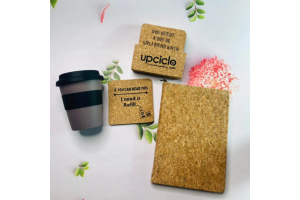Eco Friendly Lifestyle
-
Posted: July 13, 2021Categories: Eco Friendly LifestyleRead more »
Plastic is everywhere. Don’t be surprised when I say a whopping 91% of the plastics produced to date haven’t been recycled yet. Yes, 91%.
Plastic has subtly become an inherent part of our day-to-day lifestyle. Sometimes we use plastics and other non-recyclable products without even knowing that they aren’t recyclable; or, let’s say that we are not yet mindful of it. People say Ignorance is bliss, but not when your ignorance is so colossal that it will impact the world in a negative way.
-
Posted: July 13, 2021Read more »
Sustainable living is a lifestyle choice you make to tackle the dangerous consumerism mindset in you. Let me help you understand how small changes can add up to big savings, for your pockets as well as for the environment. Yes, it might feel like the little things you do for the environment are just a drop in the vast ocean of unawareness, but keep in mind that your action inspires others.
We are all trapped in the vicious circle of life, spending most of our time working, nose to the grind with no energy left to think about our way of living and our contributions to the environment. We hear people around us say over and over again that living sustainably
-
Posted: July 12, 2021Read more »
Plastic is everywhere. Don’t be surprised when I say a whopping 91% of the plastics produced to date haven’t been recycled yet. Yes, 91%.
Plastic has subtly become an inherent part of our day-to-day lifestyle. Sometimes we use plastics and other non-recyclable products without even knowing that they aren’t recyclable; or, let’s say that we are not yet mindful of it. People say Ignorance is bliss, but not when your ignorance is so colossal that it will impact the world in a negative way.
-
Posted: June 28, 2021Read more »
Plastic is ubiquitous, wherever you turn you are bound to find an item made out of plastic. It has been estimated that around 270,000 tonnes of plastic are floating across the world’s seas and is threatening more than 7000 marine life species and this is just the harm it is causing to our water bodies. It behaves like a parasite that attracts unfortunate victims making its way around the food chain, never-ending as it is non-biodegradable.
It is easier said than done to completely avoid plastic from our lives, which is why finding eco-friendly alternatives and slowly removing and replacing items of plastic is of utmost importance. Words like sustainability and green-living are hot topics now for a really good reason. We need to let go of the “Out of sight, out of mind” attitude as the world has never faced as many huge environmental problems as it is facing currently.
-
Posted: January 28, 2021Categories: Eco Friendly LifestyleRead more »
Plastic is a by product as we know and I think it has a design failure. When the manufacturers made plastic they forgot to mention that it is not designed to be disposed off.
We must have been taught the concept of recycling and saying "no"to single use plastic right from the time we got introduced to it. Why do we not think that any plastic produced till date, still exists somewhere and in some form. Today plastic is everywhere, your food, your water, your coffee cup , your carry bags , the list is endless.
This is not what our kids expect to get, when they go fishing. So what is that
-
Posted: January 07, 2021Categories: Eco Friendly LifestyleRead more »
There are consequences to everything. No matter how responsibly you dispose of your waste, you do not have the control over where it goes and where it finally ends up. What if, instead of disposing your waste responsibly, you could just avoid generating waste altogether? As good as it sounds, it is near impossible to execute - which is why we can at least control the amount of plastic we use on a regular basis. The changes you make in adopting environmental sustainability and eco-friendly practices will indeed make you healthier, and help you generate as little waste as possible.
Much of the pollution in the air is a result of things being burned. It isn’t practically possible to avoid fuels being burned while we commute in our vehicles, or the gas stoves that remain burning for long hours while we cook. Situations where we are mostly left helpless are with trucks, power plants, railways and oil refinery industries. Even
-
Posted: January 07, 2021Categories: Eco Friendly LifestyleRead more »
Our act of burning through an item and disposing of it has been followed over generations, beginning from the maker and finishing off at the landfills. Our utilization of products since the modern transformation, which further cut down item costs has resulted in higher landfills. This idea of economy is called ‘Linear Economy,’ one where materials only go further in a process that accounts to waste, with no return. For quite a while, we have been following this model of economy which is becoming truly unreasonable as time advances.
The idea on which our planet is working right currently is, “Take, Make, and Dispose of”. We take raw materials from the producers, use them to make items needed to support us on this planet, and once finished with it, we discard it, as trash. However, have you ever thought about the consequences of this simple act?
What happens
-
Posted: January 07, 2021Categories: Eco Friendly LifestyleRead more »
“You love your pet, your pet loves nature- It’s not a complicated love triangle but the most beautiful equation”- Upciclo.com
Since we have already discussed a lot on using eco-friendly and sustainable products for us, we can now witness a shift in behaviour towards following a natural and organic lifestyle. It’s high time to transfer this habit to those who are already in love with nature- Pets.
Pets are the most loving & lovable creatures on earth, and they connect well with humans. If you are a pet owner, you would know the happiness attached to having a pet. However, there is a catch-Owning a pet doesn’t make you a pet owner, but training the pet with care does. Let’s talk about some organic products for your pet (particularly dogs) that are not only good for them but also for the environment.
-
Posted: January 07, 2021Categories: Eco Friendly LifestyleRead more »
The world sees at least 2000 tonnes of plastic waste accumulated from straws, reaching the ocean each year. This amounts to a sixty-seventh, or 1.5% of the total single-use plastic waste generated on a yearly basis internationally. You must have seen the painfully upsetting video of a turtle being rescued after injuries from a plastic straw in its nose. Did you know that more than a million seabirds die every year from choking on plastic straws, which they mistake for food? In fact, because of straws, bottles and other such products, there is a high concentration of microplastics even in our drinking water and the salt we consume. This also applies to the seafood industry, most shellfish, fish and crustaceans inevitably have microplastics in their system that is not visible to us and finally entering our systems.
While straws don’t have too much of a useful purpose to serve, they are indeed handy in stirring or scooping,
-
Posted: January 07, 2021Categories: Eco Friendly LifestyleRead more »
How safely and responsibly do you dispose of the water used to clean your house? We know that our laundry, bath and kitchen waste water have nowhere else to go other than down the drain, but do we take the effort to find out where it will end up eventually? While most wastewater is treated and cleaned to be sent back into circulation for use, some of it ends up reaching natural water bodies, causing pollution and damage to the life there. More than waste from homes posing a risk, industrial waste most often goes into these rivers, lakes, and sometimes directly into the ocean. The least we can do is check the harmful effects caused by chemicals in our cleaning products, and make changes accordingly.
While most of our floor, glass, toilet cleaning and detergent fluids contain highly toxic chemicals, we haven’t looked around much to see if there are sustainable solutions which can replace these in a daily use situation. I hadn’t,








